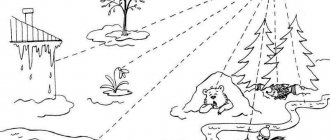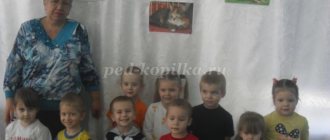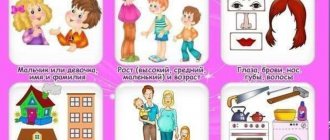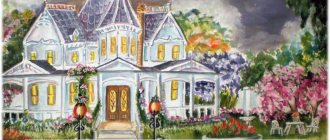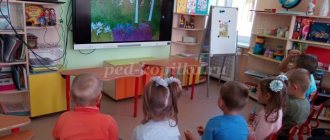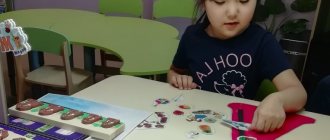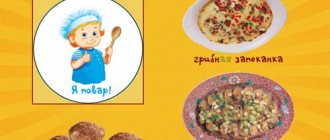Recommendations for parents on the lexical topic “Professions. Tools"
LEXICAL TOPIC
“PROFESSIONS. TOOLS"
Parents are recommended:
- Review illustrations on the topic with your child.
- Ask your child what people in different professions do, what kind of work they do, what tools they need for this.
- Tell your child about your profession (where you work, what you do, how your work benefits people).
- Recommended video material can be found at the following links:
https://yandex.ru/video/preview/?filmId=2458520053905025046&p=1&reqid=1637171094572708-4599855835564246788-vla1-4640-vla-l7-balancer-8080-BAL-9786&text=video+for nasty+for+preschoolers+on+theme +professions+in+senior&url=http%3A%2F%2Fwww.youtube.com%2Fwatch%3Fv%3DeadVReihkmE;
https://yandex.ru/video/preview/?filmId=13826083048940844904&p=1&reqid=1637171094572708-4599855835564246788-vla1-4640-vla-l7-balancer-8080-BAL-9786&text=video+ riddles+for+preschoolers+on+theme +professions+in+senior&url=http%3A%2F%2Ffrontend.vh.yandex.ru%2Fplayer%2Fv3wtWSlbIwko
Dictionary of nouns:
doctor, builder, teacher, photographer, cook, hairdresser, policeman, tailor, driver, librarian, seller, painter, electrician, fireman, oil worker, reindeer herder, teacher, nurse, seamstress, postman, work, profession, oil, gas, scissors, axe, food, pills, thermometer, pointer, books, car, dishes, faucet, tractor, brushes, paints, etc.
Dictionary of adjectives:
kind, considerate, caring, professional, conscientious, helpful, interesting, difficult, oil, gas, school, medical, etc.
Verb dictionary:
heals, teaches, educates, stews, photographs, cooks, cooks, shears, sews, flies, drives, gives out, receives, sells, counts, grows, puts, lifts, manages, paints, digs, planes, plants, digs, works, work, create, build, protect, save, drill, mine, hunt, catch, etc.
Dictionary of adverbs:
fast, beautiful, hot, bold, dangerous, etc.
Play with your child:
- "Call me kindly".
Scissors - scissors, (axe, pills, thermometer, pointer, books, car, dishes, tractor, brushes, paints, needle, thread).
- “Which one, which one?”
A doctor is responsible, kind, hardworking (builder, teacher, photographer, cook, hairdresser, policeman, tailor, driver, salesman, painter, fireman, seamstress, postman).
- "One is many."
The doctor treats - doctors treat (builder, teacher, photographer, cook, hairdresser, policeman, tailor, driver, salesman, painter, fireman, seamstress, postman).
- "What is he doing?".
Photographer – takes photographs, prints (builder, teacher, cook, hairdresser, policeman, tailor, driver, salesman, painter, fireman, seamstress, postman).
- "Do the math."
One thermometer, two..., three..., four..., five... (axe, thermometer, pointer, book, car, dishes, tractor, needle).
- “Say the opposite.”
Sick – healthy (cheerful, old, strong, cold, helpful, clean).
- "Family of Words"
Builder - construction, construction, build.
Teacher - teacher, student, teacher's room, teach.
- "The fourth wheel."
Barber, policeman, tailor, man
.
Pan, spoon, rake
, kettle.
Enable, key
, switch, turn off.
9. “Tell me how?”
How does the cook cook? - Tasty. How does a builder build? - Reliable.
What does the teacher say? - Competently. How does the driver drive? - Carefully.
How does a hairdresser cut hair? - Fast. How does a seamstress sew? - Exactly. How does a tailor sew? - Beautiful. How does a firefighter extinguish a fire? - Feel free.
10. “What’s missing?”
A cook does not have an iron, a needle, or thread (policeman, doctor, builder, fireman, teacher, hairdresser, tailor, driver, painter, seamstress).
11. Write a story about your parents’ profession according to plan.
What are the parents' names? Where and by whom do they work? What do they do at work? What do you need for work? How do people benefit from their work?
12. Read to the children:
Y. Akim “Neumeika”, S. Baruzdin “Mom’s Work”, B. Zakhoder. “Chauffeur”, “Builders”, “Shoemaker”, “Tailor”, N. Kostarev “Professions”, G. Lyushnin “Builders”, S. Marshak “Fire”, “Mail”, “Border Guard”, V. Mayakovsky “Who be?”, S. Mikhalkov “What do you have?”, “Uncle Styopa is a policeman”, N. Nosov “Dunno in a sunny city”, E. Permyak “What are hands needed for”, D. Rodari “What do crafts smell like? ", L. Skrebtsova "Wonderful Hairdresser", K. Ushinsky "Baker", "Shoemaker", K. Chukovsky "Doctor Aibolit", A. Shibarev "Mailbox".
13. Watch with your children:
https://yandex.ru/video/preview/?filmId=12186792697487926782&text=play+my+dochka+cartoon+1974&url=http%3A%2F%2Fok.ru%2Fvideo%2F88100113065
https://yandex.ru/video/preview/?filmId=15532844541679086450&text=that+will do&url=http%3A%2F%2Fwww.youtube.com%2Fwatch%3Fv%3DNjGXPEqZFiI
https://yandex.ru/video/preview/?filmId=2637878318595831508&text=who+be+cartoon+1948
https://yandex.ru/video/preview/?filmId=7772834788428625669&text=brave+tailor&url=http%3A%2F%2Fwww.youtube.com%2Fwatch%3Fv%3DXFpp67oE9dU
https://yandex.ru/video/preview/?filmId=1176832940831890907&text=magic+shop+cartoon+1953&url=http%3A%2F%2Fok.ru%2Fvideo%2F1813136804566
https://yandex.ru/video/preview/?filmId=1359900505610034539&text=in+port+cartoon+1975+watch
https://yandex.ru/video/preview/?filmId=662716543940471223&text=mess+cartoon&url=http%3A%2F%2Fok.ru%2Fvideo%2F1491881888392
We create educational games ourselves: the best services to help teachers
Services for creating educational games
- eTreniki is a designer of educational simulators, included in the TOP 30 best projects of the Competition for Innovations in Education. Offers several task concepts: Kartofan (correlation of signatures with objects on the map), Kokla (dividing words into categories), Krypton (solving words with mixed up letters), Morfunks (parsing a word according to its composition), UFO (searching for extra objects in a group).
- Learningapps is a service already known to many with interactive learning modules. The tasks are aimed at choosing the correct answer, distribution, sequencing, filling. The developers offer a wide variety of interesting templates, for example: “Who wants to be a millionaire?”, “Guess”, “Horse racing”, “Hanging”, “Couples”. The service removes a significant part of the burden of constructing and checking tests from the teacher.
- Online Test Pad is another popular service. Types of constructors: test, survey, crossword, logic games. To combine several types of exercises, a complex task designer is provided.
- Quizlet is an online service for working with virtual cards, as well as audio and written prompts. Supports about 130 languages. Among other things, it can use the “Memorization Mode” with the creation of an adaptive curriculum and a reminder function via mobile devices.
- ClassTools is an online service for creating interactive Flash resources. There are interesting templates for “QR Game Generator”, “Arcade Game Generator”, “Countdown Timer” and many others. If we talk about flash technology, it is also worth taking a closer look at the sites Jigsaw planet (creating puzzles) and Flashcard machine (creating cards).
- Hot Potatoes is a program for creating tests and crossword puzzles (download link). There are paid and free versions. Slightly outdated design, but very user-friendly interface. Ready crosswords can be printed.
- Socrative is a service for creating online surveys that students answer via mobile devices. Aimed at implementing the new global concept of Bring Your Own Device (BYOD). The teacher can add an explanation to each question, providing instant feedback. It is also worth paying attention to another quiz service: Kahoot!.
- Canva is a graphic editor in which you can create diagrams and process photographs, and then use them in educational games. Large selection of colorful templates.
- PlayPosit is a service for creating interactive videos. With its help, any video can be turned into a didactic basis for a lesson. Materials from other services are easily integrated.
- Google Maps (custom layer) is a service that allows you to build educational games based on the principle of geocaching. Other sites for working with maps: StoryMap and TimeMapper. The latter allows you to present the material both geographically and chronologically.
What else should I read?
Teaching preschoolers to navigate in space: games and exercises
“Game activities” - games and exercises to develop the prerequisites for logical thinking
Classification of didactic games in the Russian language
Entertaining astronomy for schoolchildren: games with cards
How to make educational games as effective as possible
- Use mobile phones.
Many modern electronic educational services provide work via smartphones. The teacher can write a note to the school management asking for permission to use them in class. Lessons aside, educational mobile apps are also suitable for extracurricular activities and homework. - Pay attention to the design.
Most educational Internet services have the same content, the same set of templates and differ only in design capabilities. But design should not be considered a secondary element. We are dealing with children, and a bright picture is very important for them. - Teach by playing.
Many educational online games are essentially tests, simply presented in a beautiful “wrapper”. Use them to achieve substantive results. - Integrate.
To make the project versatile, integrate some services with others. Try inserting a link to an interactive map into a QR code or colorful videos into your timeline. If there are many services, they can be combined on one site (for example, Google Sites). - Provide instant response.
It is advisable to program in the service a quick response to a student’s question or answer. This function is available, for example, in the Hot Potatoes program and the Socrative service. Just like colorful design, increased interactivity helps keep students engaged.
Let's get to know the world. Educational games with cards for children 5-6 years old (set). Didactic materials
Double-sided cards of various thematic series and a playing field with six transparent plastic pockets are used in games that develop speech, perception, attention, memory, and intelligence of preschool children. The choice and number of cards depends on the goals and level of difficulty of each game activity. In the methodological manual, the authors talk about the characteristic features of the development of children of senior preschool age, and provide recommendations for organizing play activities. A description of games with cards is also given, on the basis of which new options can be created based on the individual characteristics and pace of development of the child.
Buy
What PISA teaches us
In 2021, Russia once again took part in the international program for assessing the educational achievements of students, PISA. The results will not be available until the end of 2021, so for now we can only consider the results of the 2012 and 2015 studies. These results are not reassuring:
| 2012 | 2015 | |
| Science literacy | 37th place | 32nd place |
| Mathematical literacy | 34th place | 23rd place |
| Reading literacy | 42nd place | 26th place |
Why does this happen?
The study tests how well students can apply school knowledge to real life, which requires critical thinking skills. We, however, often make knowledge “bounce off the teeth” without much analysis. This approach really turns out to be useful in preparing for many domestic and foreign tests, but we should not forget about the student’s general literacy. When creating online simulators, experts recommend introducing creative tasks that are close to life, involving observation, analysis and other interdisciplinary competencies. #ADVERTISING_INSERT#
